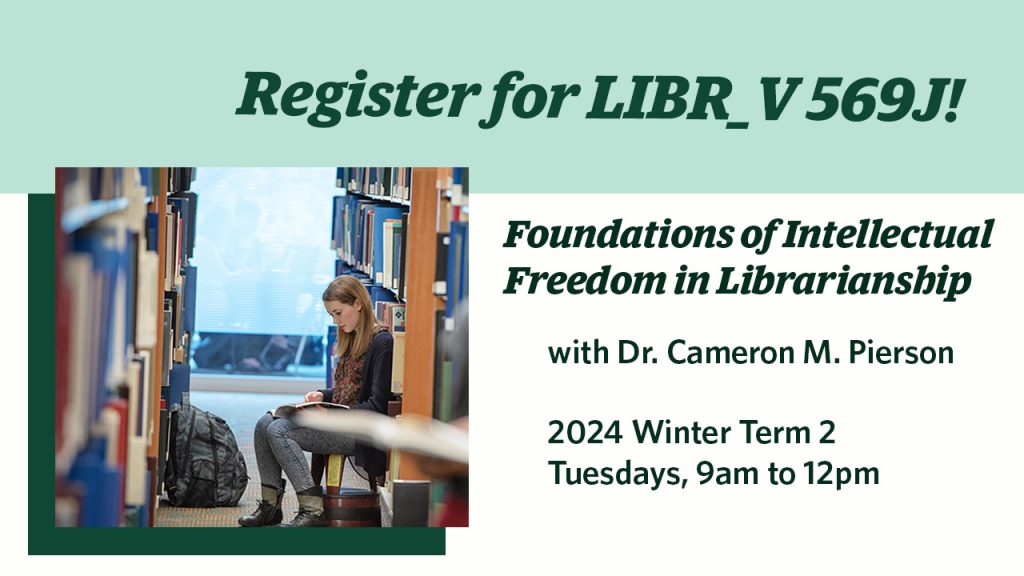

Are you looking for another LIBR_V course to take during 2024 Winter Term 2? Consider taking LIBR_V 569J Foundations of Intellectual Freedom in Librarianship, taught by Dr. Cameron M. Pierson. We recently asked him a couple questions to get to know the course better.
Q: This course emphasizes practical, hands-on learning that is grounded in real-world situations. Can you give us a preview into a course assignment and how it introduces/prepares students to navigate complex situations around intellectual freedom?
A: The heart of the course is the “Responding to a Challenge in the Library Portfolio”, a multipart group-based assignment, in which students work together to respond to a scenario based in actual controversies and adopting a real library as its site. The goal is to simulate a real challenge that might be faced by a librarian and develop a portfolio of well-crafted resources in response to this challenge, focused on library collections or policy. In the portfolio, students will assemble supportive materials, formulate a plan for managing the challenge and public relations, and craft a response to the board and challenger.
Q: Do you have a course topic that you are most excited for students to learn and discuss
A: Every topic is important and vital within the overall focus of the course. Understanding the historical roots of intellectual freedom, how the underpinning philosophy of librarianship vis-à-vis intellectual freedom has shifted in response over the last century, the inherent tensions between the fundamental concept and core value of intellectual freedom in librarianship with such notions of knowledge systems outside of the Western tradition and social justice are but a few of the topics about which students may be excited to learn more. Every topic will strengthen students’ ability to practice professionally and responsibly.
Q: What do you think is important for students to keep in mind going into the course?
A: Every class will feature difficult conversations, mirroring life in a multicultural, pluralistic society and the practice of librarianship in such a society. These topics and perspectives may include some that students may find personally offensive or upsetting. Students are expected to engage thoughtfully and empathetically with peers and content as preparation for practice in librarianship.
Q: Why did you choose to teach a topics course on intellectual freedom?
A: My background in library practice and scholarship has been characterised by international and varied library type experiences, in Australia, New Zealand, the US, Germany, and Canada. This has afforded me the ability to see first-hand how intellectual freedom is expressed and negotiated in various contexts. Previously in Germany, I taught a course on information ethics, of which intellectual freedom is an expression made manifest. It is a living conversation in society and is a central part of librarianship. I find it exciting, challenging, and irresistible!
“It is a living conversation in society and is a central part of librarianship. I find it exciting, challenging, and irresistible!”
Q: You designed the course to have many student-led components. Do you have tips for students to make the most of this learning modality?
A: Structure your time wisely. Lean into working in groups and learning from your peers. Show up for your learning community. Keep focus on what is in service to learning goals. Your instructor is always there to support you. And have fun!


